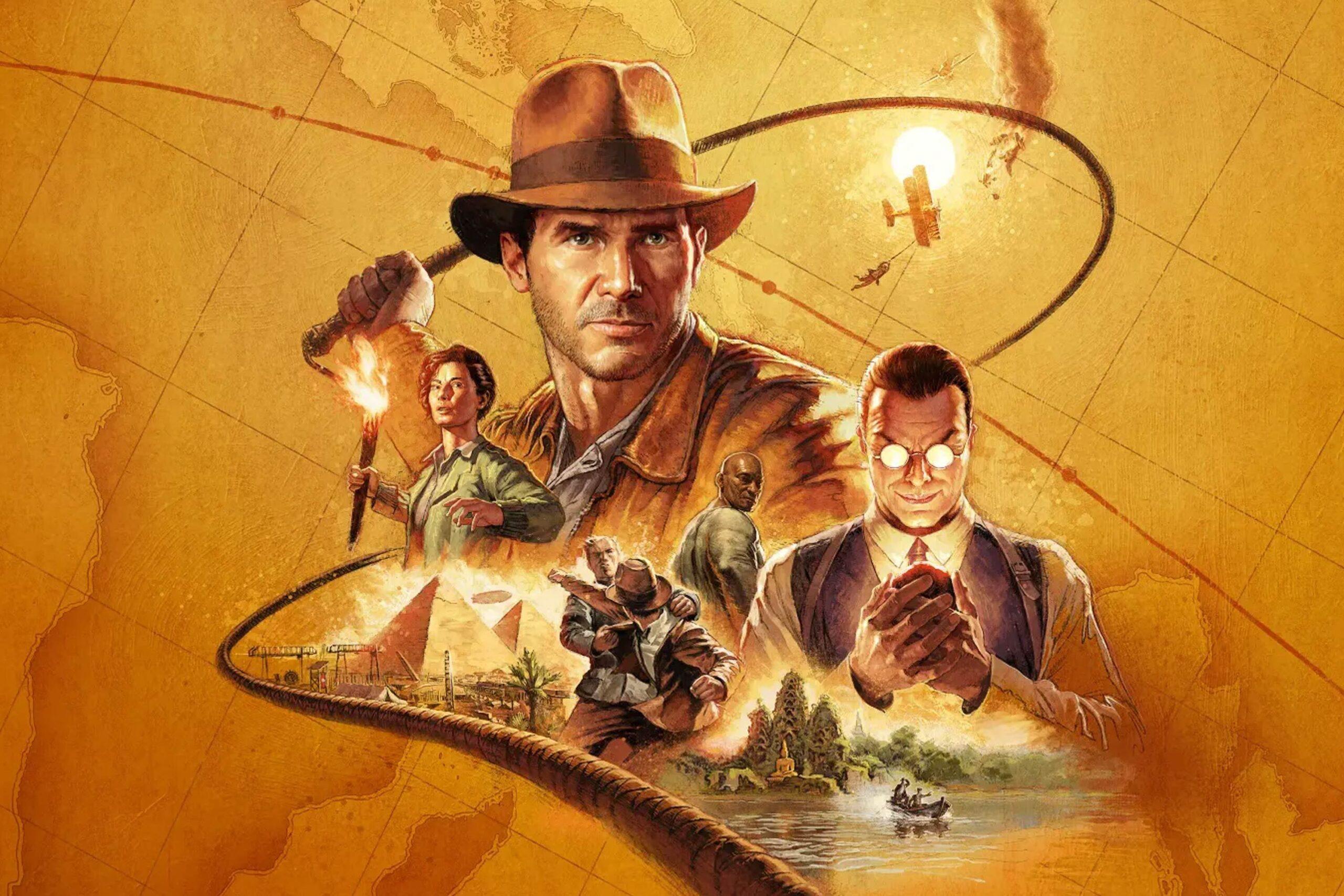The Best Video Games of 2024
This year’s gaming calendar wasn’t quite as crowded as last year’s, but our best-of list is still stacked with GOTY contenders
This year’s video game release list wasn’t quite as superlative as 2023’s—few years are that stacked—but any notion that a slump would follow last year’s peak was quickly put to rest. Once again, the games were good and plentiful. The industry continued to be plagued by layoffs, culture wars, and occasional high-profile flops, but indies and viral Steam sensations arose to fill the vacuum created by big-budget blunders and multiplayer challengers sacrificed at the altar of Fortnite and a few other dominant ongoing games. Video game adaptations continued to excel—well, mostly—and many more are on the way, along with a sequel to the Switch and (maybe) Grand Theft Auto VI. But those are matters for 2025; today, we fondly look back before we move forward. Below, we lay out our collective top 10—alongside a heaping helping of honorable mentions, because we’d dishonor ourselves if we didn’t cram in more 2024 highlights. (One caveat: With apologies to the likes of Silent Hill 2, Persona 3 Reload, Paper Mario: The Thousand-Year Door, Dragon Quest III HD-2D Remake, and many more quality titles, we’re excluding remakes, remasters, and rereleases from consideration and limiting the list to originals only—including DLC, if it deserves a spot on its own merits.) —Ben Lindbergh
10
Black Myth: Wukong
By Matt James

I almost didn’t want to include Black Myth: Wukong on our list because the discourse around it spiraled into painfully toxic chaos, and there are allegedly some very misogynistic people involved in its development. The warranted criticism surrounding Chinese developer and publisher Game Science should not be ignored. On its own, though, Black Myth: Wukong has significant value as a game and a piece of art.
The combat, although slow to excite, eventually reveals itself to be nuanced and challenging in a way that feels fair. The animated sequences that play between chapters, which feature widely differing art styles, are stunning. The character designs (and the characters themselves) are memorable, as one might expect from a game based on a book that’s been relevant for more than 400 years. Throughout my time with Black Myth: Wukong, I frequently stopped to snap screenshots of incredibly detailed, beautiful environments, many of which were actual historical sites 3D-scanned into the game. This mix of real-world history and fantasy makes the world of Black Myth: Wukong feel transportive and mysterious, like any good piece of folklore.
There’s an insidious assumption among many Westerners that no one outside of China actually likes Black Myth: Wukong (aside from anti-woke Twitter trolls who may not even own it). But the notion that the game is Elden Ring ordered from Temu is a xenophobia-tinged dismissal of the merits of its art direction, the focus of its vision, and its uncompromising ambition. While it’s understandable that some Westerners might lack the cultural context necessary to be fully attuned to the plot, it’s not unreasonable to ask players to spend 10 minutes on the Journey to the West Wikipedia page in an age of nine-and-a-half-hour Elden Ring lore videos.
So much of Black Myth: Wukong is worth experiencing. It’s a shame that the darkness of the real world interferes with the fantasy.
9
Indiana Jones and the Great Circle
By Ben Lindbergh

The Great Circle came out too late in the year to be eligible for the Game Awards, but The Ringer has no such restrictions (granted, nor do we have Harrison Ford). The Great Circle doesn’t have Harrison Ford either, aside from his digital likeness, but it does feel as authentically Indy as any film that features him—and maybe more so than some. Before the fedora-wearing archaeologist’s latest and arguably greatest gaming adventure, it had been 15 years since the last full-fledged Indiana Jones game and at least 25 since the last really good one. Only one Indy title, Indiana Jones and the Fate of Atlantis, has attained classic status, and that game came out in 1992. In the decades since, spiritual descendants Tomb Raider and Uncharted have claimed the interactive corner that could’ve been Indy’s all along.
The Great Circle reclaimed that corner not by beating those Indy homages at their own game but by embracing a different kind. In the hands of ZeniMax Media–owned MachineGames, makers of modern Wolfenstein shooters (and, via predecessor studio Starbreeze, The Darkness and The Chronicles of Riddick: Escape From Butcher Bay), Indiana Jones is less a standard action-adventure game than it is an immersive sim filled with puzzles, exploration, and side quests. Pair Dishonored/DeusEx–style gameplay with what may be the best Indy story of the past 30 years, and you have not only one of the best games of the year but also probably the best Indy game ever, more than 40 years after the first one. Of course, it’s not the years; it’s the mileage. Here’s hoping that thanks to The Great Circle, this series has some mileage left.
8
Animal Well
By Matt James

In a year that saw a major studio release a $400 million game that instantly fell flat on its face, one of the most revered games was made by a single person. Animal Well, developed by Billy Basso, is a retro-styled Metroidvania that’s densely packed with secrets and devoid of combat. This is a game that champions observation and discovery while featuring satisfyingly responsive, albeit simple, controls. There’s no tutorial or dialogue; you’re dropped into the game and asked to start bouncing your little blob through the beautifully detailed subterranean world, experimenting with environmental behaviors and pondering the potential uses of the peculiar items you stumble upon.
This is one of those games that’s most enjoyable if you avoid as much information as possible beforehand, but it’s not a spoiler to say that it contains secrets buried several playthroughs deep. Whether you’re on this ride only until the credits roll for the first time or you’re so deep down the rabbit hole that you’re sharing theories and data online with other obsessed players, this indie standout offers one of the most one-of-a-kind experiences in recent memory. Animal Well artfully executes its vision of what games can be when players are asked to assess and act without hand-holding, and it will likely be cited as an inspiration for game developers for years to come.
7
Balatro
By Matt James

Hey, would you look at that, two of the year’s most successful games were made by an individual. Developed over the course of two and half years by an anonymous Canadian known only as “LocalThunk,” Balatro is a roguelike deck-building card game that borrows elements from poker. It’s an alarmingly addictive game despite its commitment to excluding (in perpetuity) all elements of gambling. So addictive, in fact, that the announcement of its release on iOS and Android elicited reactions such as “Fuck,” and “Oh God, think I’m gonna [lose] my job.”
In each round, players attempt to clear a certain score by playing hands of cards that are subject to the wildly varying effects of joker cards picked up along the way. Even poker novices can learn the game in a matter of minutes, and it maintains a beautiful simplicity even as cacophonous card effects and multipliers interact in surprising ways to rocket your score past the target. The vast number of jokers, arcana cards, planetary cards, and modifiers ensures that every run you play is completely different from your last. There’s a lesson to be learned from Balatro about playing the hand you’re dealt and adapting when an unanticipated, potentially fortuitous path opens up in front of you.
6
Prince of Persia: The Lost Crown
By Ben Lindbergh

We believe in using the whole calendar when it comes to our rankings; great game releases used to be clustered during the holiday season, but now there’s no telling when GOTY contenders will launch. If The Great Circle’s drop on December 9 ensured that 2024 would finish strong, Prince of Persia’s arrival on January 18 ensured that it would start strong. But because The Lost Crown came out so early in the year, the memory of its brilliance may have faded for some players (provided they played it at all). If we can make room for Indy, though, we can certainly squeeze in Sargon, who’s as handy with a sash as Indy is with a whip. The Lost Crown made me think that I’m good at gaming and that gaming is good. (At least one of those things is actually true.)
This was (another) big year for Metroidvanias, but no entry in that genre released later in the year surpassed Prince of Persia, which mixed perfect, flow-state-inducing platforming and gripping combat with a map-marking feature that eased the frustration factor of the inevitable backtracking. (As did traversal that was so smooth that retracing my steps, slides, and leaps was a pleasure.) While everyone was holding their breath for a long-awaited remake of The Sands of Time, The Lost Crown got the franchise on its feet following a 14-year lull between mainline games. Series creator Jordan Mechner, who wasn’t directly involved in developing The Lost Crown, called it “the Prince of Persia game I’ve been wishing for.” For me, it was the Prince of Persia game I didn’t even know I wanted, which made it even more of an exciting surprise.
5
Helldivers 2
By Ben Lindbergh

In a year that regularly reminded us how hard it is for upstart titles to crack the rotation of heavy hitters atop player-count leaderboards year after year—the likes of Fortnite, League of Legends, Grand Theft Auto Online, Call of Duty, Counter-Strike, Overwatch, Valorant, Apex Legends, and so on (not to mention the dominant duo of Minecraft and Roblox)—Helldivers 2 called down an orbital precision strike that created an unanticipated opening in the online multiplayer landscape. Its player-versus-environment structure in a player-versus-player-oriented space, emphasis on teamwork and communication, Starship Troopers–esque camp and comedy, endearing degree of jank, and commitment to pumping out content quickly made it a meme-friendly phenomenon. Other games tried to force fan affection and failed; Helldivers 2 fostered virality and loyalty naturally.
No, the goodwill the game generated in its early days didn’t last all year. The illusion of a grand campaign that responded to player performance and preference, and the pace at which new content came out early on, wasn’t sustainable (though the most recent update is a doozy). At times, the backlash has been harsh. Players revolted about bugs (not that kind), annoying nerfs, divisive major orders, and the PSN sign-in saga. Through all the ups and downs in player counts and audience sentiment, though, the game has been a boundless source of entertainment, both online and off. Its humor, catchphrases, and cosplay were highlights of gaming culture in 2024, and its big battles and last stands have made memories that will outlast its lifespan as a popular pastime. (Never forget Malevelon Creek.) And, hey, if we’re heading toward Managed Democracy in real life, at least our time on Super Earth has prepared us for what’s in store.
4
Elden Ring: Shadow of the Erdtree
By Justin Charity

This is a DLC so good that I sprint through Elden Ring’s whole continental gauntlet, from the First Step to the Cocoon of the Empyrean, to unlock it on new playthroughs every time. It’s substantially more punishing than the base game, with a final boss that was initially more demoralizing than any other enemy I’ve fought in a FromSoftware game, but it’s also immensely gratifying as a result. Elegance and thrills: What more could I want from the expansion for a game that was already the height of zen on my PC?
3
Final Fantasy VII Rebirth
By Justin Charity

Who’d have thought that Final Fantasy VII, of all titles, would be an underdog in game-of-the-year discussions? The sequel to Final Fantasy VII Remake reportedly underperformed hard-to-please publisher Square Enix’s sales forecasts, and the critical consensus seems to have settled into the assessment that Rebirth, while good, is a bit more convoluted, a lot more bloated, and thus a little less essential than the first installment in this three-part remake project.
Though I agree with many of the common complaints about the climax, I’m a staunch defender: Rebirth really does wonderfully re-create the open-world minigame-ness of the portion of FFVII that it’s adapting, and it does so with more than enough charm, quirkiness, and style to overcome the obvious challenge of the original’s influence on so many of the open-world blockbusters with which the remake now competes. The hybrid action-menu combat still rips and, furthermore, defies the complaints—prompted in part by the recent successes of rival role-playing game powerhouse Atlus—about Square Enix’s supposed reluctance to innovate in its long-running series. Yuffie is OP, and I’m over the moon.
2
Metaphor: ReFantazio
By Justin Charity

So much of the distinct greatness of Metaphor: ReFantazio is distilled in its deliciously arrogant villain, Louis Guiabern. On the one hand, Louis—a devious army officer with a dire totalitarian outlook who’s scheming to become the new king of Euchronia—is Atlus yet again giving a human form and an unsubtle alias to Lucifer. On the other hand, Louis really is one of a kind in his savviness, his loathsomeness, his ferocity, his drip … I love-hate this smarmy motherfucker. Metaphor manages to be incredibly compelling despite being thoroughly tropey and obvious as a big, sentimental, party-based JRPG drama about the societal perils of racism.
It’s easy to underestimate the real feats here. This is an original single-player game in a market full of sequels, spinoffs, remakes, and licensed titles. Metaphor is medieval fantasy—a curious turn for Atlus, which is otherwise known for the poly-mythological occultism in both Persona and mainline Shin Megami Tensei. This is something new and exciting, even as the game’s mechanics—press turns, buff stacking, character bonds, calendar cycles, etc.—happen to scratch the itch I always have for games from the publisher that’s setting the new standard for big-budget JRPGs.
1
Astro Bot
By Ben Lindbergh

One of gaming’s main draws is its capacity to impart a feeling of empowerment. Watching Team Asobi level up from The Playroom to Astro Bot Rescue Mission to Astro’s Playroom was as intoxicating as unlocking any skill tree, not least because that progression promised to culminate in a triumphant, full-length, mainstream-accessible adventure that would leverage all the lessons the studio learned in its charming earlier efforts. Astro Bot kept that promise. Plenty of games that came out in 2024 were bigger, longer, or more poignant or profound. But no game made me (or, for that matter, my daughter) smile more while I was playing it than Astro Bot, an all-ages delight overflowing with creativity and character. Game developers often talk about the painful process of “finding the fun.” Team Asobi not only found the fun but also purified and refined it and delivered it to players in a potent, pick-up-and-play form that never wears out its welcome.Astro Bot’s PlayStation nostalgia is nice and all, even when it borders on Sony sponcon. All the end-of-year accolades make clear, though, that Astro Bot’s charms didn’t depend on drafting off of residual fondness for previous PlayStation properties. It’s as great a game as any of the classics it pays tribute to, and I hope that for its next trick, Team Asobi gets to free itself from the burden of brand-building and indulge its wildest desires. In the meantime, do yourself a favor: Spend some time with Astro Bot, find its fun yourself, and suck it up like a sponge.
Honorable Mentions
1000xRESIST, Batman: Arkham Shadow, Call of Duty: Black Ops 6, Crow Country, Dragon’s Dogma 2, Dungeons of Hinterberg, EA Sports College Football 25, Harold Halibut, Like a Dragon: Infinite Wealth, Lorelei and the Laser Eyes, Minishoot’ Adventures, Neva, Pacific Drive, Pokémon TCG Pocket, Stellar Blade, Tactical Breach Wizards, Thank Goodness You’re Here, The Legend of Zelda: Echoes of Wisdom, The Land Beneath Us, The Rise of the Golden Idol, The Operator, To the Stars, UFO 50, Unicorn Overlord, Warhammer 40,000: Space Marine 2









